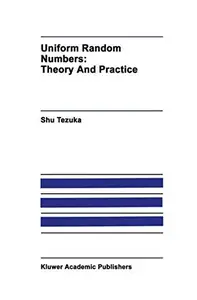
Free Download Uniform Random Numbers: Theory and Practice By Shu Tezuka (auth.)
1995 | 209 Pages | ISBN: 1461359805 | PDF | 6 MB
In earlier forewords to the books in this series on Discrete Event Dynamic Systems (DEDS), we have dwelt on the pervasive nature of DEDS in our human-made world. From manufacturing plants to computer/communication networks, from traffic systems to command-and-control, modern civilization cannot function without the smooth operation of such systems. Yet mathemat ical tools for the analysis and synthesis of DEDS are nascent when compared to the well developed machinery of the continuous variable dynamic systems char acterized by differential equations. The performance evaluation tool of choice for DEDS is discrete event simulation both on account of its generality and its explicit incorporation of randomness. As it is well known to students of simulation, the heart of the random event simulation is the uniform random number generator. Not so well known to the practitioners are the philosophical and mathematical bases of generating "random" number sequence from deterministic algorithms. This editor can still recall his own painful introduction to the issues during the early 80's when he attempted to do the first perturbation analysis (PA) experiments on a per sonal computer which, unbeknownst to him, had a random number generator with a period of only 32,768 numbers. It is no exaggeration to say that the development of PA was derailed for some time due to this ignorance of the fundamentals of random number generation.
Code:
Bitte
Anmelden
oder
Registrieren
um Code Inhalt zu sehen!